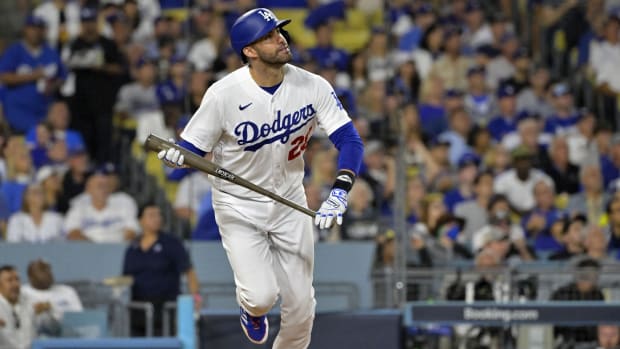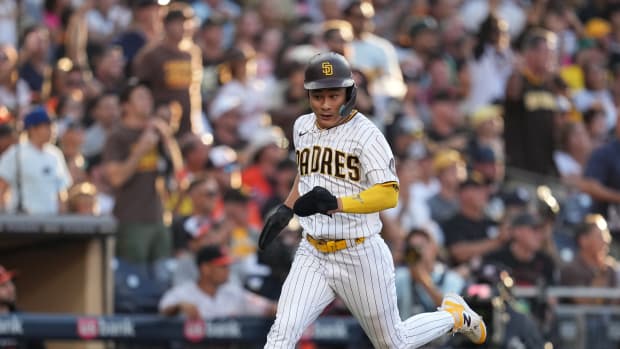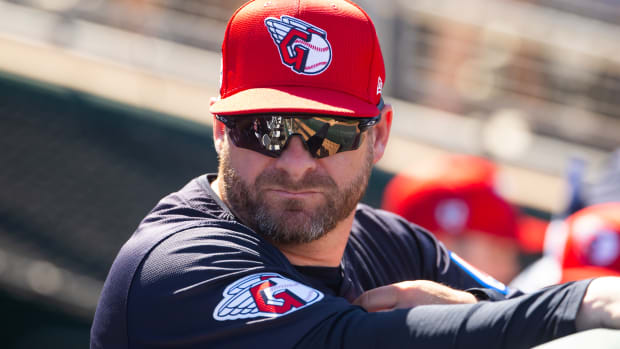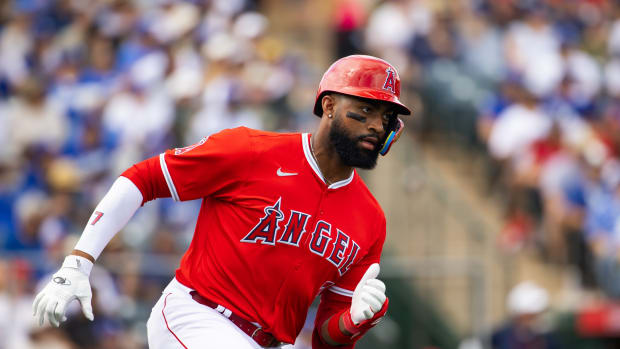Bud Selig Recounts His 'Misery' Waiting for Barry Bonds to Break the Home Run Record
The following is excerpted from the book FOR THE GOOD OF THE GAME: The Inside Story of the Surprising and Dramatic Transformation of Major League Baseball by Bud Selig with Phil Rogers. Copyright © 2019 by Allan H. Selig. To be published on July 9, 2019 by William Morrow, an imprint of HarperCollins Publishers. Reprinted by permission.
This wasn’t the Bataan Death March. Nobody was going to die or be forced into hard labor.
But the summer of 2007 was unpleasant for me, and when I look back, that’s putting it mildly. It was one of the few times in my life I wasn’t excited about going to ballparks, and if you know me that’s all you need to know.
BUY NOW
For the Good of the Game
by Bud Selig with Phil Rogers
The longtime Commissioner of Major League Baseball provides an unprecedented look inside professional baseball today, focusing on how he helped bring the game into the modern age and revealing his interactions with players, managers, fellow owners, and fans nationwide.
As Barry Bonds closed in on the all-time home run record, I flew around the country and spent my nights in places like the Four Seasons and the Westin St. Francis. I was never far from my next Diet Coke. As far as personal hardship goes, about all there was to worry about was a wait to get on a treadmill in the fitness room before getting a bite and heading out to the ballpark.
There was no way I was going to complain to anyone. Not a scintilla of a chance. But everyone who knew me knew I was unhappy.
They could see it on my face, in my lack of enthusiasm. I was surrounded by people I enjoyed, but even amid good company I felt alone with my thoughts. I was tired, and I’ll admit it, I was haunted by regret. My mind raced as I searched for ways I could have avoided these long days and nights.
Bonds was on the verge of breaking Henry Aaron’s record for career home runs, and I was doing what a commissioner of a sports league is supposed to do. I was hopscotching around the country to be in attendance when the self-absorbed slugger hit the record homer.
Like Shoeless Joe Jackson and Pete Rose, Barry had brought scandal to the game I’d fallen in love with as a boy and now led as baseball’s ninth commissioner. I wasn’t going to sing his praises, as I’d done for Mark McGwire and Sammy Sosa when they smashed Roger Maris’s single-season homer record in 1998, but I didn’t want to be conspicuous by my absence, either. So in a stretch of sixteen days I watched Bonds and the San Francisco Giants play nine times. It was not one of the highlights of my life.
The Bonds Watch started for me at Miller Park in Milwaukee, where at least I could watch from my own suite and sleep in my own bed. The next stops were San Francisco, Los Angeles, and San Diego, where I was just waiting for Barry to put me out of my misery. He could have done it quicker, but one of the beauties of baseball is you can’t orchestrate it.
In the end, the game rewards perseverance; it does not serve up a whole lot of convenience to anyone who makes it their life’s work.
After watching Barry go homerless in a series against the Braves at AT&T Park in San Francisco, I traveled cross-country to induct Cal Ripken Jr. and Tony Gwynn into the Hall of Fame.
Then I flew home from Cooperstown for a quick rest before moving on to L.A. and Dodger Stadium. I had hit the road when Barry was two homers shy of Henry, not wanting to take anything for granted. I could have spared myself many nights on the road, because he homered only once in a stretch of thirty-seven at-bats, getting to 754.
Bonds was stuck there—in a slump, actually—and I had business back home, so I flew to Milwaukee for a quick pit stop after leaving Dodger Stadium. That meant another cross-country flight, this time to San Diego to watch the Giants play the Padres at Petco Park.
Along the way, I had a lot of time to think about the differences between Barry Bonds, who simply wasn’t likable, and Henry Aaron, who had been such a giant on the field and now was the same way off the field, carrying himself with as much poise as humility. I have called myself a friend of Henry’s since 1958 and burst with pride every time I speak about him.
Henry was one of the greatest hitters to ever play the game. He was still a Brave when he broke Babe Ruth’s record, but I brought him back to Milwaukee to finish his career as the Brewers’ designated hitter. It took Aaron twenty-three seasons to get to 755 home runs, never hitting more than forty-seven in a season.
But it wasn’t my friendship with Henry that troubled me as I waited for Bonds to hit the 755th and 756th home runs of his career. It was the way Barry had piled up homers in the second half of his career, at a rate that seemed impossible to Henry and players from baseball’s other generations.
We had been caught off guard when McGwire and Sosa passed Maris, but this was almost a decade later. Of course, by then we knew what was going on. This was an age when sluggers found extra power through chemistry, and, of course, Barry was one of the leading men in baseball’s steroids narrative.
There is plenty of blame to spread around in this sad chapter, and I’ll accept my share of the responsibility. We didn’t get the genie back in the bottle in time to protect Aaron’s legacy. Henry knows we tried, but I’ll always wish we had been successful in implementing testing for performance-enhancing drugs sooner than we eventually were, as part of labor negotiations in 2002.
I first got to know Henry when I sold him a Ford at my family’s dealership in Milwaukee. I was a wide-eyed kid then, eaten up by baseball but without any idea I would ever be more than one of the most passionate fans you’ve ever seen. Henry says I was a certain kind of fan in those days. I was one of those fans that a player knew he was going to have to get to know whether he wanted to or not. He’s probably right about that. I was persistent in everything I did and it brought me many rewards in my lifetime, none I treasure more than my friendship with Henry.
He is as fine a man as I’ve ever known, and, as one of baseball’s first African American players, he has endured hatred few of us have known. He once shared with me a box of letters that was full of death threats sent to him as he was getting closer and closer to Ruth’s record.
The letters were horrible, as was the treatment that Henry received early in his career. But his belief in himself, his faith, and his country was unshakable. Henry hit the last twenty-two of his 755 homers playing for the Milwaukee Brewers, when I was the owner. Braves owner Bill Bartholomay and I worked out a trade that allowed us to bring him back from Atlanta to the city where his major league career had begun, and his leadership, his presence, helped Robin Yount develop into a player who could thrive in tough circumstances, as he did in leading us to the 1982 World Series.
I wasn’t there when Henry broke Babe’s record, but I listened closely to Vin Scully’s famed comments. I’ve listened to them over and over through the years. They give you chills.
“What a marvelous day for baseball. What a marvelous moment for Atlanta and the state of Georgia. What a marvelous moment for the country and the world. A black man is getting a standing ovation in the Deep South for breaking a record of an all-time baseball idol. And it is a great moment for all of us, and particularly for Henry Aaron.”
Scully, one of baseball’s greatest voices, got it exactly right. It was a great day for the South, a great day for baseball. It was everything you’d ever want, and it made you proud. Proud you were seeing history made by a man who had conducted himself so beautifully. But what I was experiencing on the Bonds Watch was not making me proud.
Look, Barry was a great player. Let me make that very clear. A great player. He was a Hall of Famer long before he got associated with steroids. But like so many other players, some of them great players, he had made some really bad decisions—decisions that would shape their legacies while complicating mine.
While I felt responsibility to be on hand for Bonds’s moment, I’ll admit I had a fantasy that I’d be spared when I went to Cooperstown to see Ripken and Gwynn be inducted into the Hall of Fame. Nobody would have blamed me for being there rather than on the road with Barry. But I received no reprieve, so I trudged on to Dodger Stadium and then Petco, the Padres’ beautiful home that had opened only three years earlier.
I watched the first game of the Giants-Padres series with John Moores, who owned the Padres. He was a good host, but I’m not sure I was good company.
I trudged up to a box high atop the stadium the next night. I didn’t mind being by myself. I thought I’d experienced every emotion possible at a ballpark. I’d been nervous a lot and angry more often than I’d like to admit. I’d chain-smoked and I’d felt the level of peacefulness that my friends talk about after long hikes at a national park. I’d been exhilarated and had moments of pure joy. But this took me to a place I’d never been before, and I’ll admit it.
I was thinking about that and a million other things as I watched Bonds drive a pitch from the Padres’ Clay Hensley into the seats in left field in San Diego, setting off a celebration as he tied Henry’s record.
I didn’t go to the clubhouse to congratulate him afterward. I just couldn’t bring myself to look him in the eyes and act happy about what he’d done. I don’t exactly have a poker face.
When Barry hit No. 756 at AT&T Park three days later, pulling a fastball from the Nationals’ Mike Bacsik over the fence in right-center, I was in New York at a baseball meeting, watching the game on TV. I had planned to fly back to San Francisco the next day, but finally Barry did something I liked. He saved me one trip. It was the least he could do.
After the record-breaking home run, the video board at AT&T Park played a tribute to Bonds from Henry Aaron. He hadn’t been sure he wanted to do anything to commemorate the moment, but I persuaded him to record his congratulations, no matter the circumstance. I told Henry I felt it was the right thing to do, and Henry always did the right thing.
This awkward spectacle was the final exclamation point in an era of unprecedented power hitting throughout baseball. I’d seen it all, studied it, and would continue to study it for years.
I know some people will forever link me with Barry Bonds. Some will say baseball’s failure to limit the impact of steroids quicker is my failure. They may even call me the steroid commissioner.
That’s okay, I guess.
It’s not fair, I don’t like it, but I’ve come to understand it. Did I understand the dimension of the problem from the beginning? No. But did other longtime, well-respected executives, like John Schuerholz and Andy MacPhail? No, they didn’t, and they say that.
Steroids became a bigger issue than any of us imagined when we were watching Mark McGwire and Sammy Sosa in the summer of 1998. But through my work with owners—eventually with cooperation from the players union, which was kicking and screaming all the way—we ended up with baseball having the toughest steroid policy in sports.
I couldn’t be prouder as I look back. The same is true for the economic overhaul of the sport during my tenure.







































